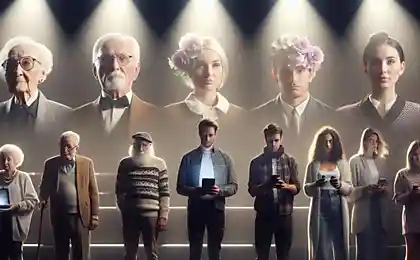311
What's wrong with chimeras: opinions of other generations | We understand how Generation Z differs from others and what skills it lacks
854284
In a world where technological progress moves at the speed of light, the differences between generations are becoming more pronounced. Especially often in the focus of criticism and discussion is Generation Z – buzzers, born from about 1997 to 2012. Their habits, values, and approaches to life raise many questions for older generations. In our previous article "Generations of the XX-XXI century: from the Great to Alpha". We have already given a general description to all modern generations, including the buzzers. Today, we will dive deeper into the analysis of Generation Z through the prism of perceptions of other generations.
Zumers are the first generation to be born in the fully digital age. They do not know a world without the Internet, smartphones and social networks. This feature has formed a unique set of skills and behavioral patterns that older generations sometimes find difficult to understand and accept.
Zumer eyes of other generations: the main claims
Criticism of buzzers often reflects the classic generational divide, a phenomenon that has always existed. “The young generation is terrible” is a phrase that was heard in ancient Egypt. However, modern differences have their own specifics, due to unprecedented technological and social changes.
1. Dependence on digital technologies
Boomers (1946-1964) and Gen X (1965-1980) criticize buzzers for their excessive attachment to smartphones. A Pew Research Center study found that 95 percent of teens have a smartphone and 45 percent are online “almost all the time.” Millennials (1981-1996) note the problem as content: short videos on TikTok and YouTube Shorts are perceived as superficial, forming "clip thinking."
2. Communication skills
“They don’t know how to talk live”, “They can’t look into the eyes of the interlocutor”, “It’s easier for them to write a message than to call” – typical remarks of older generations.
Studies confirm that buzzers prefer text messages to calls. According to Common Sense Media, 35 percent of teens experience anxiety on the phone. Professor Sherry Turkle notes that young people often find it difficult to communicate lively, requiring spontaneous reactions and emotional engagement.
3. Attitudes towards work and career

Another hot spot in the perception of buzzers is their approach to work and career building. Generation X and Boomer employers often complain about the lack of traditional work ethic among buzzers:
- Reluctance to work overtime
- Require flexible schedules and remote work
- Prioritizing work-life balance over career growth
- Frequent change of work (on average, the buzzer changes jobs every 2-3 years)
- Perception of work as a source of self-realization, not just earnings
4. Impatience and the need for instant feedback
Zumers have grown up in a world of instant access to information and immediate feedback on social media. This formed a special type of perception, manifested in impatience and difficulty with long-term planning.
Psychologist Gene Twenge, in his book iGen, notes that Generation Z shows signs of an “accelerated pace of life,” where prolonged waiting causes discomfort. To Boomers, such impatience often looks like a lack of stamina.
What are the Zumeras really missing?
Beyond subjective claims, there is objective evidence of skills that are underdeveloped in Gen Z. It is important to understand that this is not the fault of the buzzers, but the result of changes in the environment, education and social context.
1. Critical thinking skills in information chaos
According to the Stanford History Education Group, more than 80 percent of students can’t tell the difference between sponsored content and online news. Despite being technically literate, buzzers often lack the necessary tools to critically evaluate information.
The problem is compounded by features of social media algorithms that create “information bubbles” that restrict access to diverse viewpoints. As a result, a polarized perception of reality is formed, where there is no place for nuances and semitones.
2. Stress resistance and emotional regulation
Research by the American Psychological Association shows that buzzers report higher levels of stress than any other generation. 91% of 18-23 year olds report physical or emotional symptoms related to stress, such as depression or anxiety.
There are several factors that explain this phenomenon:
- Information overload and constant exposure to negative news
- Social pressures amplified by social media and a culture of perfectionism
- Economic uncertainty and high competition
- Insufficient development of mechanisms of emotional self-regulation
Many Generation X and Boomer parents note that their zoomer children often have difficulty with basic household tasks. An interesting study by H&R Block found that 61 percent of young people rate their financial management skills as "unsatisfactory," and 43 percent don't know how to complete tax returns.
The modern educational system focuses on academic knowledge and digital competencies, with practical skills for survival in the real world often left behind. This creates a paradoxical situation: technologically advanced buzzers can be helpless in solving prosaic life tasks.

Gen Z Strengths: What Seniors Can Learn
It would be unfair to talk only about shortcomings. Generation Z has a number of qualities and skills that can be considered competitive advantages.
- Adaptability to change Zumers have grown in the era of constant technological revolutions and quickly adapt to new conditions.
- Digital literacy Intuitive understanding of digital technologies and platforms
- Value-based approach Studies show that buzzers are more demanding on the ethical aspects of work and consumption
- Entrepreneurial thinking According to Gallup, 40% of buzzers want to become entrepreneurs.
- Global thinking Thanks to the Internet, buzzers are more aware of global issues and open to international cooperation.
Practical recommendations for buzzers
Based on objective data on the skills that Generation Z lacks, the following recommendations can be made:
1. Develop critical thinking
- Practice Information Diet – Limit Content Consumption and Analyze Sources
- Look for points of view that are opposite to your beliefs.
- Learn the basics of logic and argumentation
- Use fact-checking techniques – check information from multiple independent sources
- Practice regular “digital detox” – periods of complete disconnection from social networks and gadgets
- Learn mindfulness and meditation techniques
- Develop “uncertainty tolerance” – the ability to deal with situations where there is no clear answer or solution.
- Keep a Gratitude Diary – Write down 3-5 things you are grateful for every day
- Learn the basics of financial literacy – at a minimum, learn how to budget, understand taxes, and invest.
- Master basic household skills - cooking, minor repairs, clothing care
- Develop real-life interpersonal skills – practice keeping a conversation off the phone
- Learn to plan long-term projects and complete them
Advice for other generations
Effective intergenerational interaction is a two-way process. Here’s what older generations can do:
- Avoid generalizations and stereotypes Each Zumer is unique, just like any other generation.
- Recognize the strengths of buzzers their digital skills, flexibility of thinking, value orientation
- Be mentors, not critics. Share your experience, but don’t impose your beliefs.
- Learn from buzzers Be open to their approach and world view
- Create mixed teams In the workplace, encourage intergenerational collaboration
Conclusion
Intergenerational relationships have always been and will be complex. Each new generation is formed in unique conditions and is inevitably different from the previous ones. Instead of asking “what’s wrong with the buzzers?” it’s more productive to ask “how can we better understand each other and collaborate effectively?” ?
Generation Z has a unique set of skills and characteristics that reflect the world in which they grew up. Yes, Zumer lacks some traditional competencies, but they compensate for this with other qualities that will be critical in the future.
Ultimately, the success of society depends on the ability of different generations not just to coexist, but to interact productively, learn from each other and together solve the global challenges of our time.
Glossary
Generation Z (zoomers)
Demographic cohort following millennials. Approximate years of birth - 1997-2012. The first generation to grow up in an era of widespread Internet and mobile technology.
The generational divide
Differences in beliefs, values and behaviors between generations that can lead to misunderstandings and conflicts.
Clip thinking
A method of perceiving information in short, bright fragments without establishing logical connections between them. A characteristic feature of the digital age, when information is consumed quickly and superficially.
Information overload
A state of stress caused by receiving more information than a person is able to process, leading to difficulty making decisions and reduced performance.
Digital detoxification
A period of conscious restriction or complete abandonment of the use of digital devices and the Internet in order to reduce stress and restore psychological balance.
Tolerance for uncertainty
Psychological characteristic, reflecting the ability of a person to accept conflict and tension arising in a situation of duality, to resist incoherence and inconsistency of information.
Pew Research Center, Common Sense Media, American Psychological Association, Gallup and H&R Block. Read more about different generations in our article “Generations of the XX-XXI century: from the Great to Alpha”. Who are they?”























